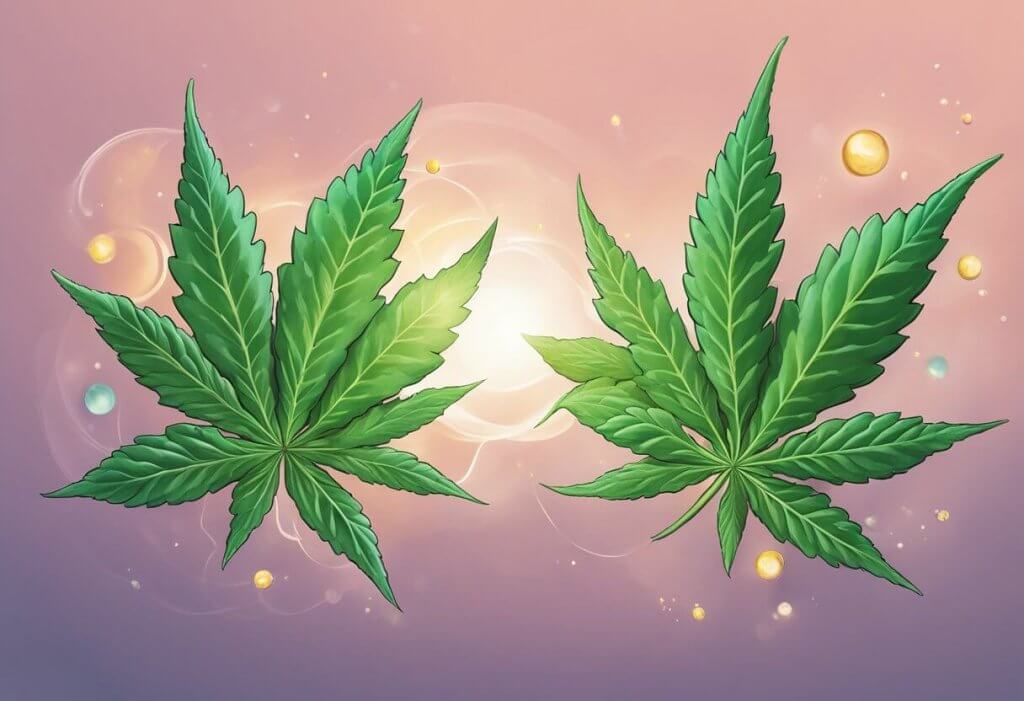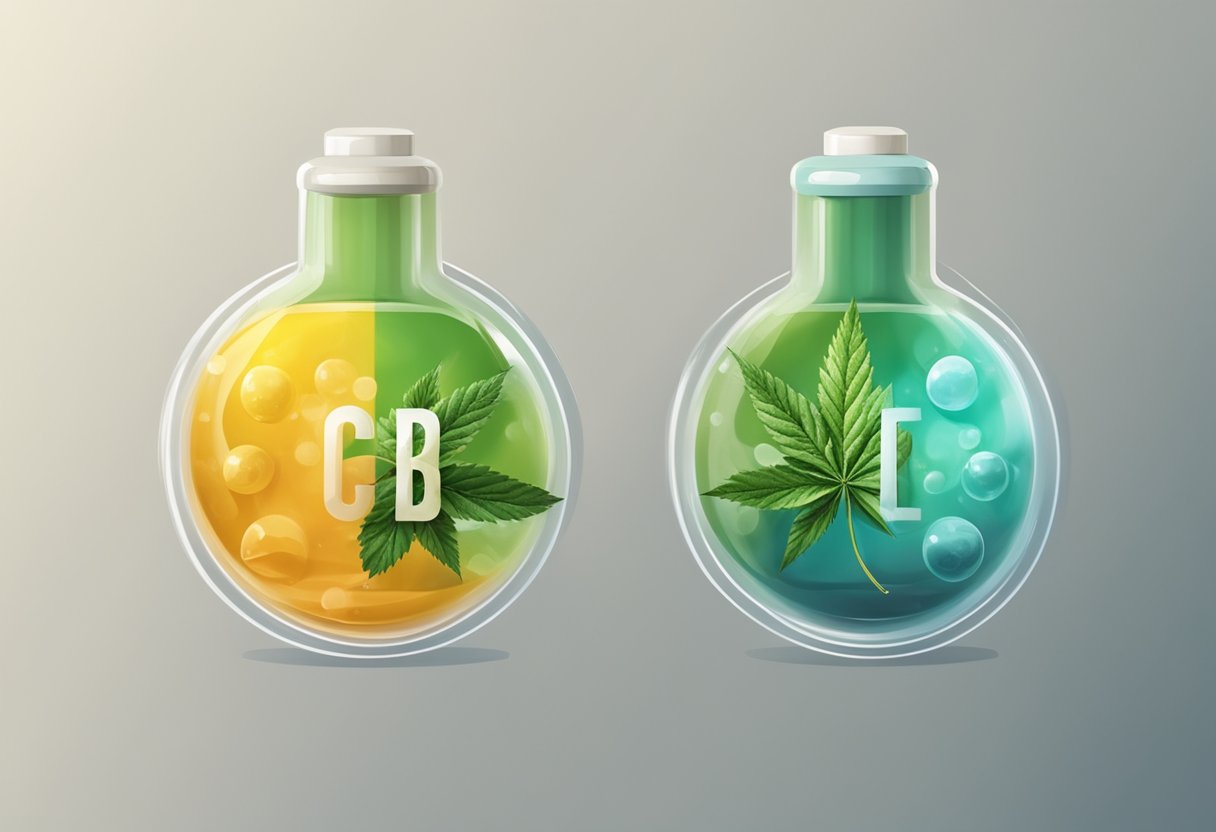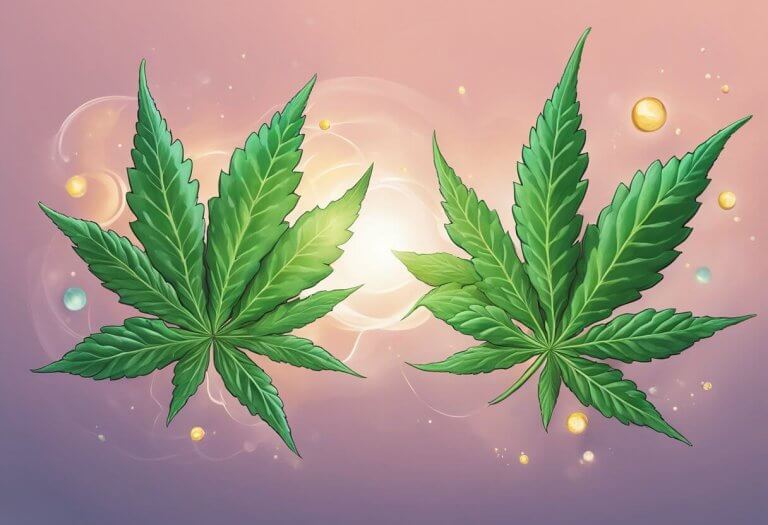Cannabidiol (CBD) and tetrahydrocannabinol (THC) are the two primary cannabinoids found in the cannabis plant, which has species including both hemp and marijuana. Despite their origin from the same plants, CBD and THC differ significantly in their psychoactive effects and how they interact with the body and mind. CBD is renowned for not being psychoactive, meaning it doesn’t produce the “high” associated with cannabis use. On the other hand, THC is the main psychoactive component of cannabis and is responsible for the high feeling.

While both compounds interact with the body’s endocannabinoid system, they do so in different ways and result in different effects. These differences are crucial for users to consider when selecting products for therapeutic purposes.
CBD has gained popularity for its potential health and wellness benefits without intoxicating effects, making it an appealing option for individuals seeking relief from pain, anxiety, and other conditions. Meanwhile, THC remains a key compound for both recreational users and those seeking certain medical benefits, though its legal status varies by jurisdiction.
The balance between CBD and THC in cannabis products is a major factor in the plant’s therapeutic application and legality.
Key Takeaways
- CBD and THC are the main cannabinoids from the cannabis plant, with CBD being non-psychoactive.
- They interact with the body’s endocannabinoid system but have different effects on the mind and body.
- The therapeutic use of CBD and THC varies, and their legal status depends on the jurisdiction.
Health and Therapeutic Applications

Cannabidiol (CBD) and tetrahydrocannabinol (THC), both components of the cannabis plant, have notable yet distinct influences on health. They are leveraged for their therapeutic benefits, which include pain relief and anti-inflammatory properties, as well as the management of conditions such as epilepsy and multiple sclerosis. Each compound has FDA-approved uses and potential benefits along with side effects, prompting considerations for safety in their use.
CBD vs THC: Key Differences
| Compound | CBD | THC |
|---|---|---|
| Psychoactive | No | Yes |
| Potential Medical Uses | Anti-inflammatory, anti-anxiety, anti-seizure | Pain relief, appetite stimulant, glaucoma treatment |
| Side Effects | Minimal, some fatigue | Intoxication, anxiety, paranoia |
Medical Cannabis and FDA-Approved Uses
Medical cannabis, which can contain both CBD and THC, has been approved for various treatments. Epidiolex, an FDA-approved CBD extract, is used for the treatment of seizures associated with conditions like epilepsy. THC is featured in drugs such as dronabinol to combat nausea and vomiting from chemotherapy and to increase appetite in patients with AIDS.
Potential Benefits and Side Effects
Both CBD and THC are recognized for their potential health benefits. CBD may help alleviate anxiety, depression, and insomnia, while THC may offer pain relief and help with loss of appetite. However, they can also cause side effects: CBD might lead to dizziness or drowsiness, and THC might cause increased heart rate, paranoia, or other psychiatric effects, especially when used recreationally.
- Pain Relief: Both compounds can help with chronic pain, particularly neuropathic pain.
- Inflammation: CBD is noted for anti-inflammatory effects which can aid conditions like multiple sclerosis.
- Mental Health: CBD may improve symptoms of anxiety and PTSD, while THC might worsen them.
Considerations for Use and Safety
When using medical cannabis, whether in the form of tinctures, gummies, capsules, or extracts, safety considerations are crucial. Users should be aware of the potential for failing drug tests due to the presence of THC. Chronic use might affect memory, coordination, and movement, and its intoxicating qualities can lead to impaired driving. High-quality products and proper dosing are important to minimize risks like drowsiness, dry mouth, and dizziness.
Comparing CBD and THC

Cannabidiol (CBD) and delta-9-tetrahydrocannabinol (THC) are two well-researched cannabinoids with distinct properties and effects. The comparison between these compounds encompasses their molecular composition, how they interact with the body’s receptors, their psychoactive effects, and their legal status across various regions.
“THC is the primary ingredient in cannabis that produces the high and most of the psychoactivity. CBD is not psychoactive by itself but has been shown to be neuroprotective.”
Dr. Ethan Russo, a neurologist and cannabis researcher
Chemical Structure and Receptors
CBD and THC have similar chemical structures, but subtle differences drastically affect how they interact with cannabinoid receptors. Both interact with the endocannabinoid system, but THC binds with CB1 receptors in the brain to produce psychoactive effects, while CBD has a low affinity for these receptors, influencing the system indirectly.
Psychoactive Properties and Effects
THC is renowned for its strong psychoactive properties, leading to sensations of euphoria or a high. In contrast, CBD is non-psychoactive and doesn’t produce these effects. Interestingly, CBD might mitigate the psychoactive effects of THC, reducing its potency and altering the sensation experienced.
Legal Status and Availability
Legality varies significantly between CBD and THC: THC is listed under the Controlled Substances Act and is federally illegal, although some states allow it for medicinal or recreational use. CBD derived from hemp is federally legal under the Farm Bill, subject to restrictions, making it widely available. Further details on the legal distinctions can be examined in an article from Verywell Health or by reviewing the latest federal laws and state regulations.
A Promising Research Study: CBD can help offset some of the cognitive impairments and psychotic symptoms caused by THC.
https://www.nature.com/articles/s41386-022-01478-z
Frequently Asked Questions
CBD and THC both come from the cannabis plant, but they interact with the brain differently and are subject to different legal regulations.
What’s the deal with CBD and THC when it comes to chilling out my anxiety?
CBD is generally considered to be non-psychoactive and may help to alleviate anxiety without causing a “high,” while THC can reduce anxiety in some individuals but may increase it in others.
Edibles showdown: What are the real differences when you’re munching on CBD versus THC?
Edibles containing CBD won’t impart the same psychoactive effects as those with THC. They might reduce anxiety and promote relaxation without intoxication, whereas THC-dominant edibles provide the well-known euphoric effects.
Legality Lowdown: Where does THC stand compared to CBD when it comes to the law?
THC is still illegal under federal law, while CBD derived from hemp is legal at federal level, provided it contains less than 0.3% THC, but state laws vary greatly for both substances.
Can you compare the effects of CBD vs THC for me in plain speak?
CBD often imparts a sense of calm and can help with inflammation without inducing a high. In contrast, THC can cause intoxication, alter one’s mood, and affect memory and attention.
What should you know before slathering on CBD and THC topicals?
Before using topicals, know that CBD is typically marketed for pain relief without psychoactive effects. THC topicals might provide pain relief along with some of the psychoactive effects, depending on their formulation and your skin’s absorption rate.
“After struggling with insomnia and anxiety for years, I was at my wit’s end with prescription drugs. CBD has been a game-changer – it helps me sleep through the night and calms me without the groggy side effects. I’m so grateful to have a natural alternative.”
Jessica M., Chicago
